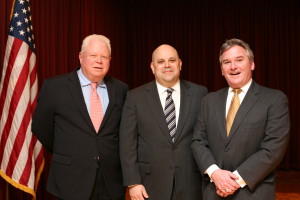With the nation slowly recovering from recession, the economy will continue on an upward trajectory this year, said Peter Gioia, Connecticut Business & Industry Association economist and vice president.
His remarks came at the Greater Norwalk Chamber of Commerce”™s 2014 Economic Outlook & Development Review event sponsored by Fairfield County Bank at the Continental Manor.
“Connecticut is being dragged into sustainable recovery because it sells a lot of goods and services out of state,” Gioia said. “Now more customers are able to purchase those goods and marginally more people are being employed.”

Gioia said an improving job market may cause the unemployment rate to rise as job seekers who have given up their search go back to job hunting. Connecticut will experience job gains of 20,000 to 24,000 this year and up to 28,000 next year, which is “pretty darn good compared to where we”™ve been,” he said.
Gioia said the potential shortage of the labor force will be the “tipping point” as baby boomers retire, a process already begun. He added that an immigration bill in Congress could potentially solve the labor force shortage in the coming years.
“People who are immigrants are much more likely to be entrepreneurs and start their own businesses than people who were born in the U.S.,” Gioia said. “They end up being net employers of people who are born in the U.S.”
North America as a whole is on its way to energy independence, which will boost the U.S.”™s economy and safety, Gioia said. Other indicators of economic improvement include strong activity in the stock market, profitability in U.S. firms, moderation in gas prices, resolution to the debt ceiling argument in Washington, D.C., and improvements in manufacturing.
Felix Serrano, chairman for the Norwalk Redevelopment Agency Commission, and Tim Sheehan, executive director of the Norwalk Redevelopment Agency, provided overviews of ongoing and existing economic developments in the city.
One example is the General Growth Properties”™ (GGP) purchase of the 12.6-acre District 95/7 redevelopment property. Serrano said it”™s too premature to make assumptions on what the developer plans to do with the West Avenue building site.
“While there”™s much public speculation that GGP is advancing a mall development, neither the agency commission, its staff nor anyone involved with the city government has yet seen an actual development plan from GGP,” Serrano said.
Sheehan added that the city plans to focus on mixed-use developments, which he said has its challenges. Norwalk has a strong multifamily housing development sector. But the challenge is swaying renters to come back into the communities by providing high accessibility to transit and work opportunities. Single-living options, also, are needed for renters between ages 20 and 34, as opposed to family-sized homes.
Fairfield”™s office space market is depressed and will remain that way in the foreseeable future, Sheehan said. The county”™s availability of office space was 22.5 percent last year, marking the 10th straight quarter in which the market remained flat at 22 percent. Norwalk”™s top office space availability rose to 22.4 percent from 21.4 percent last year.
Norwalk remains the second largest retail market in the Bridgeport-metro area with approximately 6.2 million square feet of space. Stamford is the largest with a little over 7 million square feet. Norwalk has the lowest overall retail vacancy rate at roughly 3.6 percent in both the Bridgeport-metro area and Westchester County, N.Y., Sheehan added.
Among Norwalk”™s completed and ongoing economic development projects are:
Ӣ the five-story SpinnakerӪs SoNo Ironworks development at 20 North Water St., featuring 107 apartments and more than 20,000 square feet of retail and restaurant space;
Ӣ the completion of CervalisӪs 167,000-square-foot data center;
Ӣ a Phase 2 Avalon Bay project at Norden Place, which calls for adding 240 apartments and four single-family homes;
Ӣ the sale of a seven-story building with 150,000 square feet of office space at 40 Richard Ave.; and
Ӣ LoweӪs property purchase closing on its future site on Connecticut Avenue.
Sheehan said Norwalk”™s planning and zoning department issued more than 1,500 permits last year, which is the highest number since the city began keeping track in 1992.
The way to combat economic development challenges in Norwalk is to ensure that the development plans and projects are “consistent with and positively contribute to the environment,” Sheehan said. He added that the city must approve development projects that “not only enhance the city”™s grant list but make the city a better place.”















